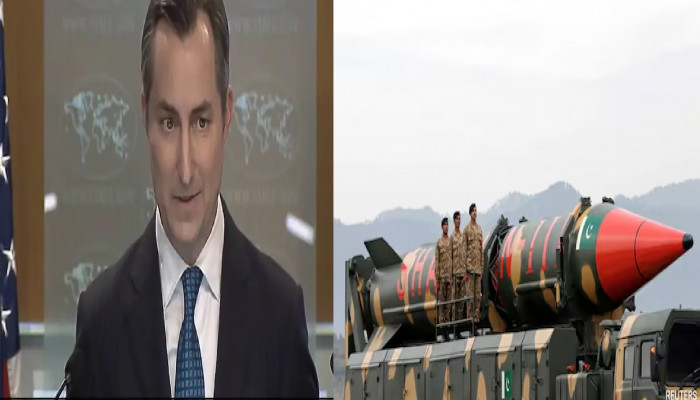US imposes sanctions on four entities aiding Pakistan's ballistic missile program
- In Reports
- 02:23 PM, Dec 19, 2024
- Myind Staff
On Wednesday, the United States imposed sanctions on four entities in Pakistan, including a state-owned defence agency, for their involvement in the country’s long-range missile program. According to US State Department spokesperson Mathew Miller, the sanctions are aimed at individuals and groups linked to the spread of weapons of mass destruction and their delivery systems.
The sanctioned entities include the National Development Complex (NDC), a key organisation in Islamabad that has played an important role in developing Pakistan’s ballistic missiles. NDC is responsible for creating the Shaheen-series missiles and has acquired specialised equipment to support these missile development efforts. In a statement, Pakistan's foreign ministry called the US move "unfortunate and biased" and warned that it could jeopardise regional peace by "exacerbating military asymmetries," namely its competition with nuclear-armed India. The US sanctions also mentioned three other Karachi-based companies.
Akhtar and Sons Private Limited, which has provided various equipment for NDC’s missile development. Affiliates International, which has been involved in acquiring missile-related items for NDC and its programs. NDC has benefitted from Rockside Enterprise's provision of a range of equipment necessary for Pakistan's missile program. The statement claims that the sanctions are intended to stop the spread of WMDs and stop more destabilising events in the area. The Bulletin of the Atomic Scientists claims that Pakistan's Shaheen-series missiles are capable of producing nuclear weapons, according to a Reuters story. Pakistan became a nuclear-armed country in 1998 after conducting its first nuclear weapons test, joining the group of nations with nuclear capabilities. It is estimated that Pakistan currently has around 170 nuclear warheads.
The Shaheen-III, first tested in March 2015, is Pakistan's longest-range missile. The project, which began secretly in the early 2000s in response to India's Agni-III missile, has a range of about 2,750 kilometres. This allows the Shaheen-III to reach India's far northeastern regions, including the Andaman and Nicobar Islands and plays a key role in Pakistan's nuclear second-strike capability.
According to reports, Shaheen-III can eliminate targets as far away as Israel in 12 minutes. Additionally, according to former Lt Gen (R) Ghulam Mustafa, the missile moves eighteen times faster than sound. The Shaheen-III, the largest missile in the Shaheen series, replaces the Shaheen-I and Shaheen-II ballistic missiles. On March 26, 2022, Pakistan successfully tested the Shaheen-1A, a surface-to-surface ballistic missile that travelled 900 km into space.







Comments